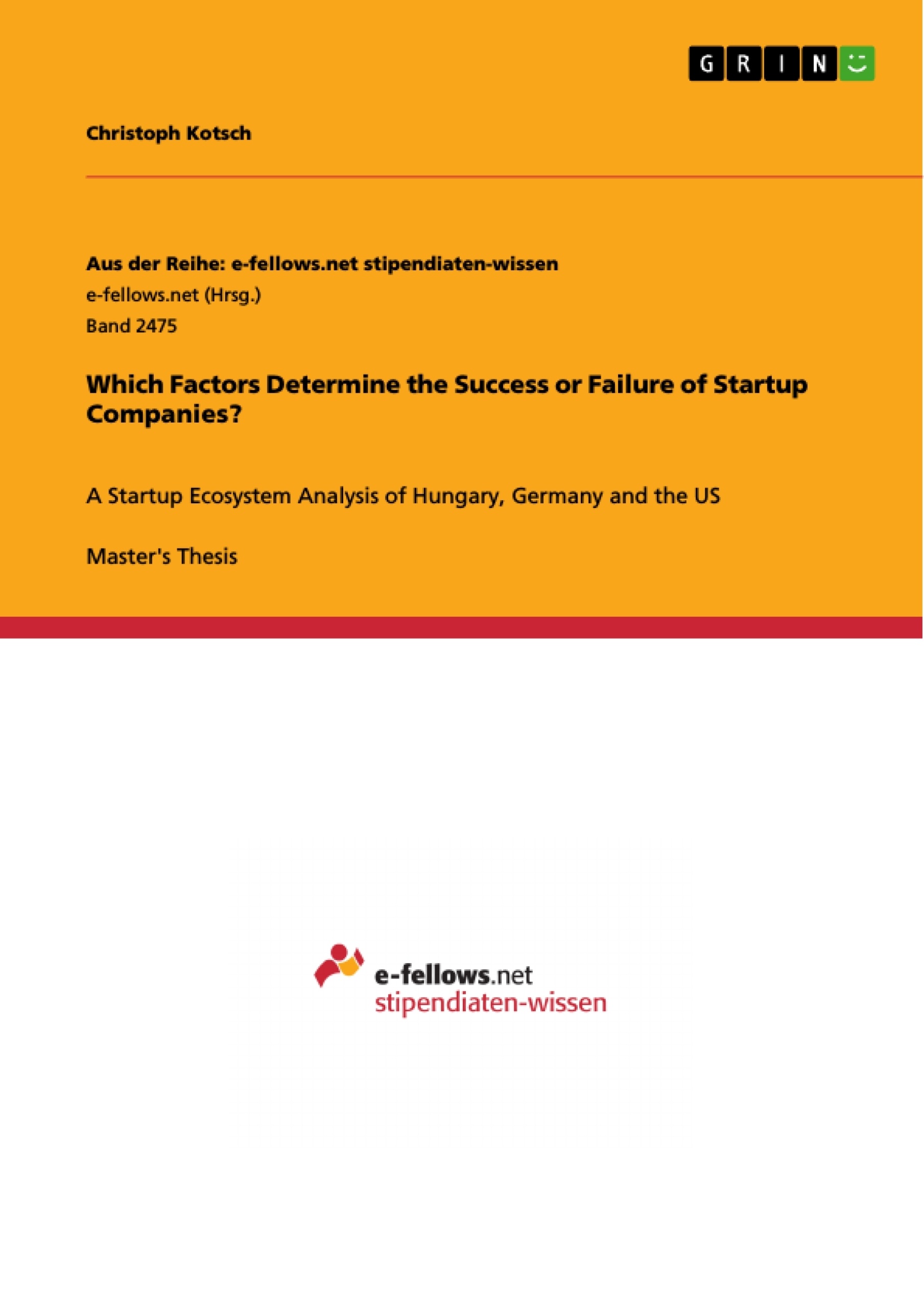As more and more startup companies are founded every year worldwide, building up one’s own business does not get easier. Since 9 out of 10 startups fail, future entrepreneurs are well advised to take a look at potential reasons for failure and success. Learning from others’ mistakes and studying success stories can improve their own performance and help to avoid critical errors.
The academic paper at hand will provide valuable insights for entrepreneurs. After delivering an overview of the most commonly used terms and definitions in the startup scene, chapter 6 will describe the components of a business idea and how experts can assess a company’s value.
Subsequently, the most important factors for a startup company’s success, according to literature review, will be listed and illustrated. Various standpoints of academic research and studies will be discussed. Delineating both internal and external factors, this thesis not only delivers a synoptic view of potential challenges inside a startup as well as in its ecosystem, but also juxtaposes these influences in opposition.
The second part of this paper analyzes a series of interviews with twelve startup founders from three different regions (the province of North-Rhine Westphalia in Germany, Budapest in Hungary and the state of California in the US). Their views and experiences will be summarized and put into the context of their respective startup ecosystem.
This way, the study is able to provide an understanding of the distinctive attributes of these ecosystems. Furthermore, the interviewees’ challenges and advices will be compared to previously reviewed literature. Therefore, the reader is able to gain insights from an academic perspective, as well as from real-life examples.
Table of Contents
- Introduction
- Definitions
- Startup Company
- Startup Ecosystem
- Innovation
- Valuation of a Business Idea
- Innovativeness and Originality
- Scalability
- Feasibility
- Typical Factors of Failure and Success
- Internal Factors
- Personality of the Founders
- Timing of Realization
- External Factors and the Startup Ecosystem
- Presence and Availability of Talents
- Entrepreneurial Community
- Ways of Funding
- Bank Loans
- Family and Friends
- Crowdfunding
- Government Funding
- Business Angels
- Venture Capital
- Startup Incubators and Accelerators
- Personal Funding
- Educational Institutions
- Complexity of Bureaucracy and Regulations
- Potential Customers
- Productive Infrastructure
- Quality of Life
- Internal Factors
- Real-Life Examples
- Research Methodology
- Startups in NRW, Germany
- Brickspaces
- Calumia
- Goedle
- Donatia
- Startups in Budapest, Hungary
- RateMate
- Barion
- Bigo
- YouAte
- Startups in California, US
- RidePIN
- Noora Health
- In Spirit
- Aero Glass
- Comparison and Analysis
- Ecosystem Analysis of Startups in NRW, Germany
- Ecosystem Analysis of Startups in Budapest, Hungary
- Ecosystem Analysis of Startups in California, US
- General Analysis and Discussion
- Limitations of the Study
- Factors determining startup success or failure
- Internal and external factors influencing startups
- Startup ecosystem analysis
- Comparison of startup ecosystems in Hungary, Germany, and the US
- Role of funding, infrastructure, and talent in startup growth
Objectives and Key Themes
This master thesis aims to analyze the factors that determine the success or failure of startup companies in the context of the startup ecosystem. It investigates the role of both internal factors, such as the personality of the founders and the timing of realization, and external factors, including the presence and availability of talents, entrepreneurial community, funding opportunities, and the broader ecosystem's infrastructure. The study focuses specifically on comparing and contrasting the startup ecosystems of Hungary, Germany, and the United States.
Chapter Summaries
The thesis begins by defining key terms such as "startup company," "startup ecosystem," and "innovation." It then explores the valuation of a business idea, considering factors like innovativeness, scalability, and feasibility. The subsequent chapters delve into typical factors of failure and success, examining both internal factors, such as the personality of the founders and the timing of realization, and external factors, including the presence and availability of talents, entrepreneurial community, funding opportunities, and the broader ecosystem's infrastructure. Each chapter provides an in-depth analysis of these factors, exploring their impact on startup success.
The final chapters of the thesis present real-life examples of startups in Germany, Hungary, and the United States. Through these case studies, the author conducts a comparative analysis of the startup ecosystems in each country, examining the specific challenges and opportunities faced by startups in these locations. The thesis concludes by summarizing the findings and outlining the limitations of the study.
Keywords
This master thesis focuses on the factors influencing the success or failure of startup companies. The key concepts explored include startup ecosystem, internal and external factors, funding, talent, infrastructure, entrepreneurial community, and a comparative analysis of the startup ecosystems in Hungary, Germany, and the United States.
- Quote paper
- Christoph Kotsch (Author), 2017, Which Factors Determine the Success or Failure of Startup Companies?, Munich, GRIN Verlag, https://www.grin.com/document/372343




